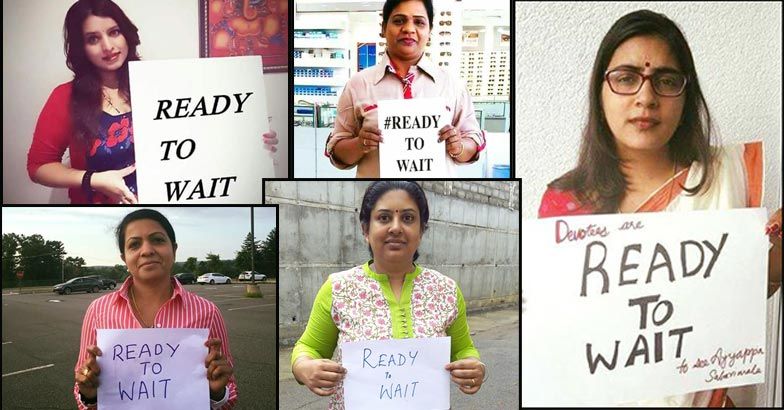I saw her standing along with the men and women who were defending their beliefs against Honourable Supreme Court’s decision. I asked her “why?” She said and I quote “It is a time of strange happenings, where a glass is kept tied to a water cooler and a mug to the tap because people don’t trust each other. I do trust my Deity and I believe that I should wait outside this temple till I am 50 years old. I do remember the last time I went inside. It was a different time. People were more helpful, more emotional, more responsible and more pure though they were less mature; less educated and had less money. People have developed over time and so has our country but I think people don’t believe anymore. Justice is not always about one side or the other, sometimes the best justice on sensitive matters include his, her, ours, and anyone’s and everyone’s beliefs.” It froze me for a moment and then I woke up.
When Gandhari realised that her husband was blind, she blindfolded herself in order to be a partner in disability, and empathetic humans voluntarily accept limitations on their rights when the need arises. Kerala women, taking a bold decision to not enter the temple because of the nature of their Deity is in itself a message. Everything can’t be linked to feminism or gender equality. Kerala is one of the most progressive states of India, with the highest literacy, least infant mortality and least girl child abortion. And people are hell bent to prove gender inequality exists here.
There are a few rituals that are followed according to the scriptures and beliefs. There is no discrimination on the basis of gender. Women who are below 10 or above 50 are allowed inside the temple. The age-entry restriction applies only to Sabrimala, where Swami Ayyappa is worshipped as a Nashtika Brahmachari (eternal celibate). But there are 140 othe Ayyappa temples in Kerala alone where these restrictions don’t apply.The right to pray is guaranteed for anyone if they are willing to look beyond Sabrimala- and that too for a part of their lifetimes.
The Kerala Government pays 51lacs every year to the temple and some people are of the opinion that it is a donation made by government from the taxpayer’s money and all the taxpayers can visit. But it was actually a rent agreement signed between the King of the region and the temple for the land that was rented by the temple. When the Ironman of India united princely states along with all the assets all the liabilities fell on the state as well.
Many Muslim restaurants, for example, shut shop when the faithful observe their Ramzan fasts. They open only when the fasts are to be broken after dusk. Surely, Supreme Court is not naive enough to believe that the burden of someone’s fasting is falling on the non-fasters? It is faulty logic. Just because keeping women out is a part of the celibate make-up, it does not mean there is a corresponding burden on those kept out. They can go elsewhere. Supreme Court went on to say that rights are for humans, not deities. The celibacy logic of Sabarimala temples is for those devotees who abstain from sex and other kinds of indulgences when they come to this famous temple. It is not about the deity’s rights alone. There are a few rituals in many temples where everything is performed by women and men aren’t allowed and there are a few vice versa. We shouldn’t try to make an issue on everything.
The people who are demanding that, women from other religion should not be allowed inside the temple are wrong as well. We are one of those who believed in “Vasudhaiv Kutumbakam” and we should let anyone and everyone who has faith in Ayyappa enter the temple after following all the rules and rituals. The court’s negative attitude towards Sabarimala needs questioning from many points of view. It is wrong to view the entry restrictions purely from a binary gender perspective which holds that if some women are barred for some time, it must be discrimination.
More than 2000 innocent devotees have been put into jail and protest continues.In a country of dumb media, deaf government and blind legislation, the sufferings of common man remain unseen, stories of miseries untold and painful voices unheard.







0 Comments